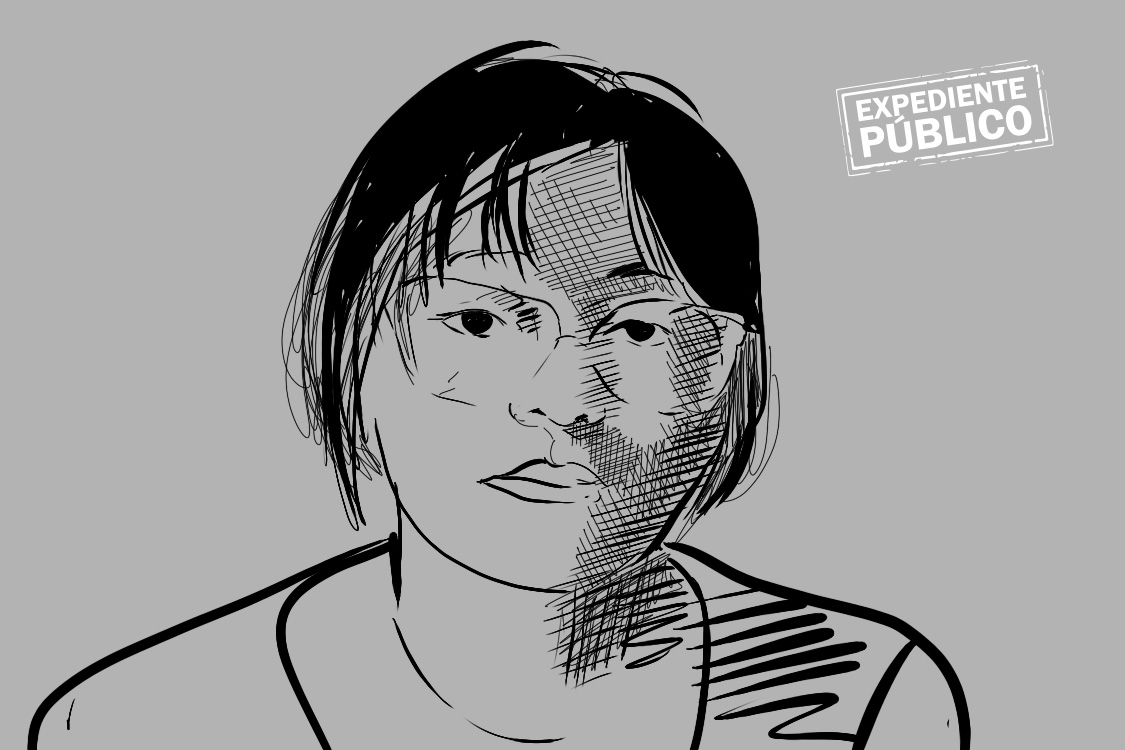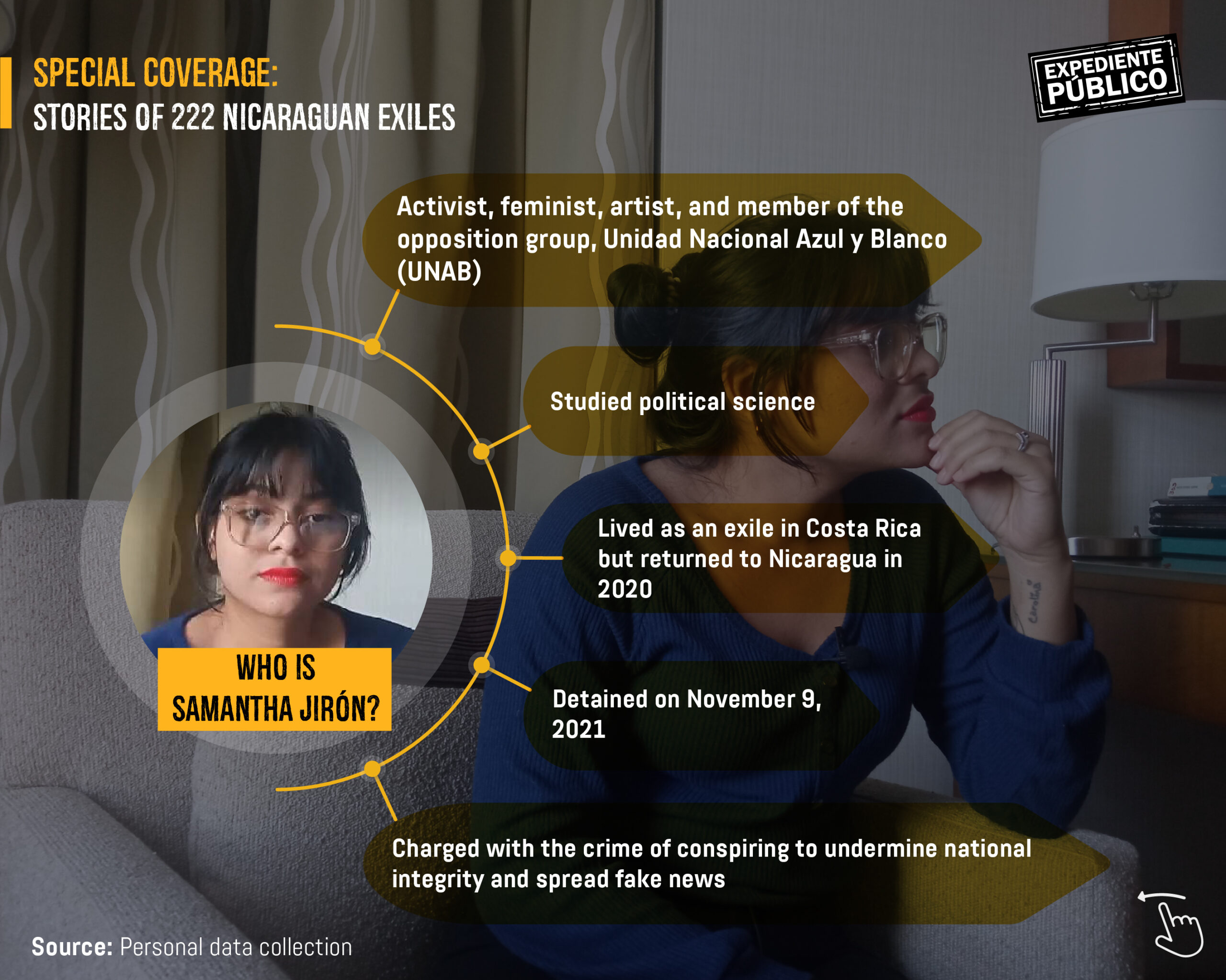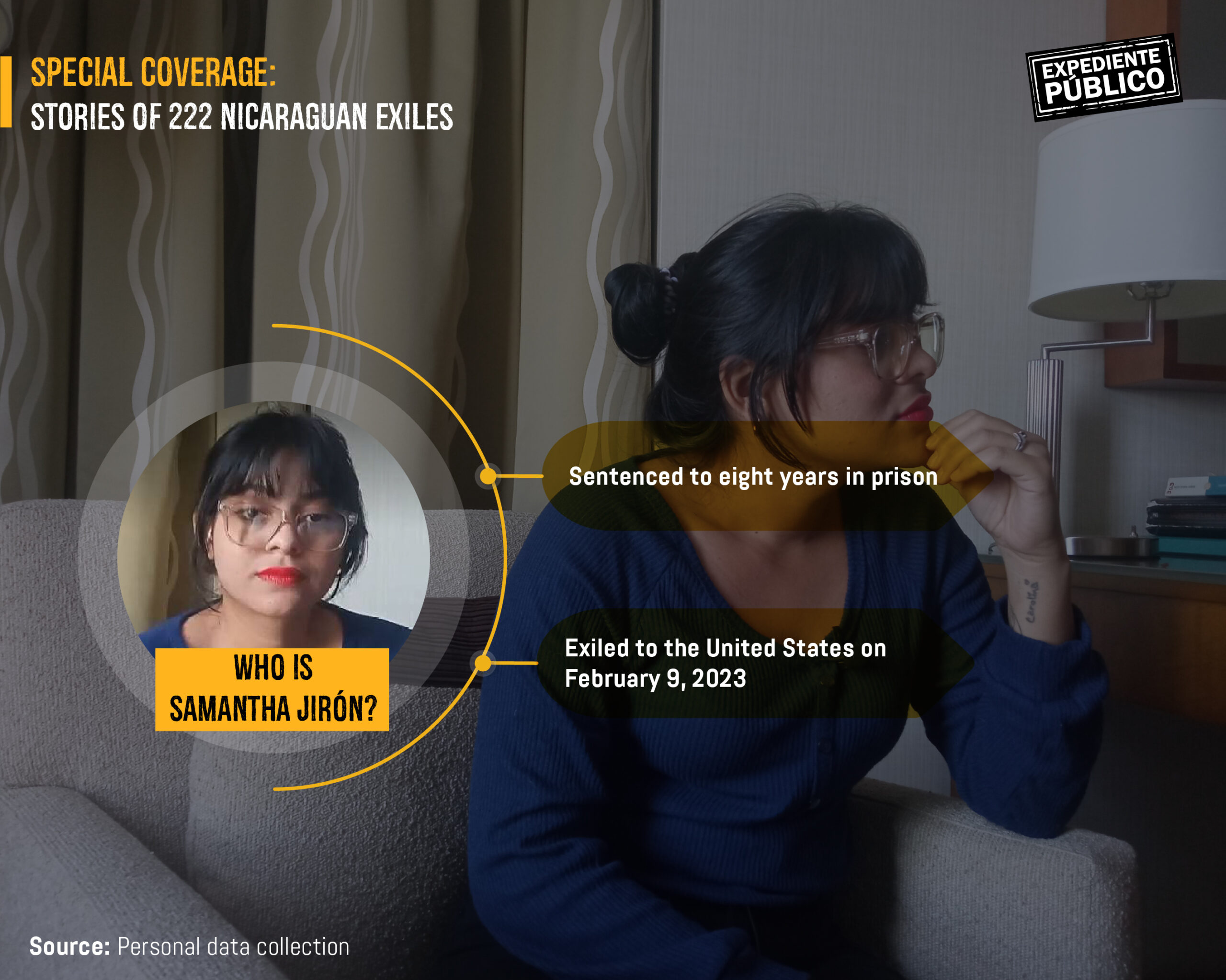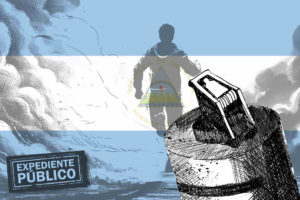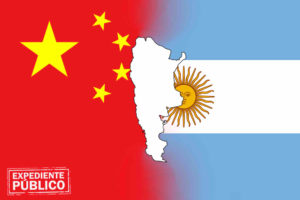*Member of the Unidad Nacional Azul y Blanco (UNAB), Samantha Jirón spent a year and three months in prison, following her being captured by civilians in 2021.
**Now that she is free, her priority is reuniting with her family and defining her future.
***During the “Azul y Blanco” operation, which took the former prisoners to the United States, a humorous broadcast was provided by the businessman and president of COSEP, who took the microphone and said, «This is your flight attendant Michael Healy, please sit down.»
Expediente Público
While she was in prison, the young political leader, Samantha Jirón dreamed every day of being free and seeking asylum in Spain. Suddenly, without understanding what was happening and feeling totally bewildered, she boarded a plane and landed in the United States, where she was sent by Daniel Ortega and Rosario Murillo and became an exile, without rights in Nicaragua.
At night on February 8, 2023, an official at the Comprehensive Penitentiary Establishment for Women (EPIM in Spanish), also known as La Esperanza, woke Samantha up and said, ‘Get up, get up. You are going to be transferred.’”
“I woke up totally bewildered. I got up and put on my glasses. I was still in pajamas when the official said, ‘Grab your personal items, whatever intimate items you need.’ So, I grabbed my undergarments and toiletries. They brought us out at 10:30 at night,” Jirón told Expediente Público.
On November 9, 2021, Jirón was kidnapped by civilians in Managua, the capital, and taken to El Chipote prison where she was subjected to interrogations during the day. At night, she was transferred to Police District Three, another prison in the southwest of Nicaragua.
She was charged with the crimes of conspiring to undermine national integrity and spreading fake news. In March 2022, she was sentenced to eight years in prison and a fine of 30 thousand córdobas.
“I was able to see my mother two months after my detention. My family filed a writ of habeas, which was accepted but left unfulfilled,” said Jirón.
The activist remained in prison for one year and three months until February 9, 2023, when Daniel Ortega and Rosario Murillo ordered the exiling of 222 political prisoners.
Her interest in Spain
The former political prisoner was one of the first Nicaraguans declared stateless to opt for Spanish nationality. Spain has offered nationality to the 222 political prisoners expelled from the Central American country.
The young activist affirmed that Spain was one of her options. “I am very interested in the option of Spain. I like the idea a lot. In fact, it was always an option of mine. I thought about going voluntarily if they released us and sent us home to our families in Nicaragua,” said the young woman from Masaya.
Read: Así fue la “operación azul y blanco” para sacar de Nicaragua a los 222 expresos políticos
The member of Unidad Nacional Azul y Blanco (UNAB) explained to Expediente Público that she needed more information to make a decision since her future depends on it. She does not want to expose herself to a situation that would affect her emotionally.
“This is one of the decisions that will define the rest of my life, so I also need to think very hard about what would benefit and help me most and what would allow me to feel the best because, sincerely, I do not want to lose. I have no sense of belonging. I feel that it was taken away from me,” added Jirón.
Her stay in “La Esperanza”
On December 1, 2021, she was transferred to the prison for women, La Esperanza. In that prison, she received visits every 21 days, but “the custodian was always right next to her, listening to all of the conversation” with her family.
In that prison, Samantha got up at five in the morning and spent the entire day in solitary confinement. There was a time when they approved her for “yard and sun,” but later that right was stripped from her, and she was isolated for six months.
“After seven months of isolation, they sent me to live with the common inmates. I was in cellblock four with 70 prisoners. We shared bathrooms, and a toilet, and it was very difficult to live together because there were very few that respected the other women. There were others who wanted to attack and offend us, meanwhile, others even said that the authorities had authorized them to do things to us,” said Jirón.
The night before her exile, she could see that in cellblock five María Esperanza Sánchez was also “getting her things together.” “My first thought was, ‘yes, we are going to be free. We are finally going to be released,’” she said.
As she walked and crossed the “security checkpoint,” she said to herself, “we are indeed leaving.”
“We were taken to a room where they labeled our things, gave us medicine and the commissary that our families had left for us, took a picture of us, and gave us a change of clothes. I was in a state of shock, just seated without knowing how to react,” she explained.
Hours of agony
Jirón said that they were put on buses whose windows were closed, meaning that they could not see outside. She did not know that she was at the air force terminal of the Augusto C. Sandino Airport until she heard the noise of aircraft engines.
“I can only define those hours as agony because knowing the capacity of the regime to do harm and since I could only see military personnel, I sincerely thought that they were going to do something to us, and I entered a state of shock. But when I heard an airplane take off, I said, ‘now I know where we are. We are at the airport.’”
Read: Los cinco fieles a Daniel Ortega y ahora desterrados que nadie quería albergar en EE.UU.
She corroborated that before getting on the plane, the prisoners were made to sign a document in which they “voluntarily accepted to travel,” but the document did not indicate the destination.
“Someone approached me and asked what my name was, searched for my passport, and asked if I wanted to travel to the United States. In tears, I hugged that person, who told me that everything was going to be fine, that it had all ended, and that I should board the plane because the farther away from these people the better,” she said.
Her arrival in the US
Her first few days in the United States, the country that had welcomed her after being expelled from Nicaragua, were filled with “a lot of uncertainty.”
Her friends and acquaintances were waiting for her, and her family had already reached North American soil.
For now, she does not have anything concrete planned, except for one priority which is to “reunite with my family soon and be with them. We have suffered a lot, and my mother has also been hit very hard by this situation and was exposed to many things. That said, the most important thing is to reunite with them.”
Read: Edward Lacayo, “La loba feroz”: “Nicaragua es una gran prisión”
The young woman said that she will never forget the day that she left Nicaragua. “It was wonderful, emotional. It was a day that I will never, never forget in my life.”
That day, there was not enough time to “hug or see one another, cry, say that everything would be fine, or catch up on everything, particularly how we had all been.”
She said that it was incredible to experience 222 political prisoners singing the national anthem when they took off and landed and that the humor of the flight was set when, according to Jirón, businessman Michael Healy took the phone and said, “This is your flight attendant Michael Healy, please sit down.”

